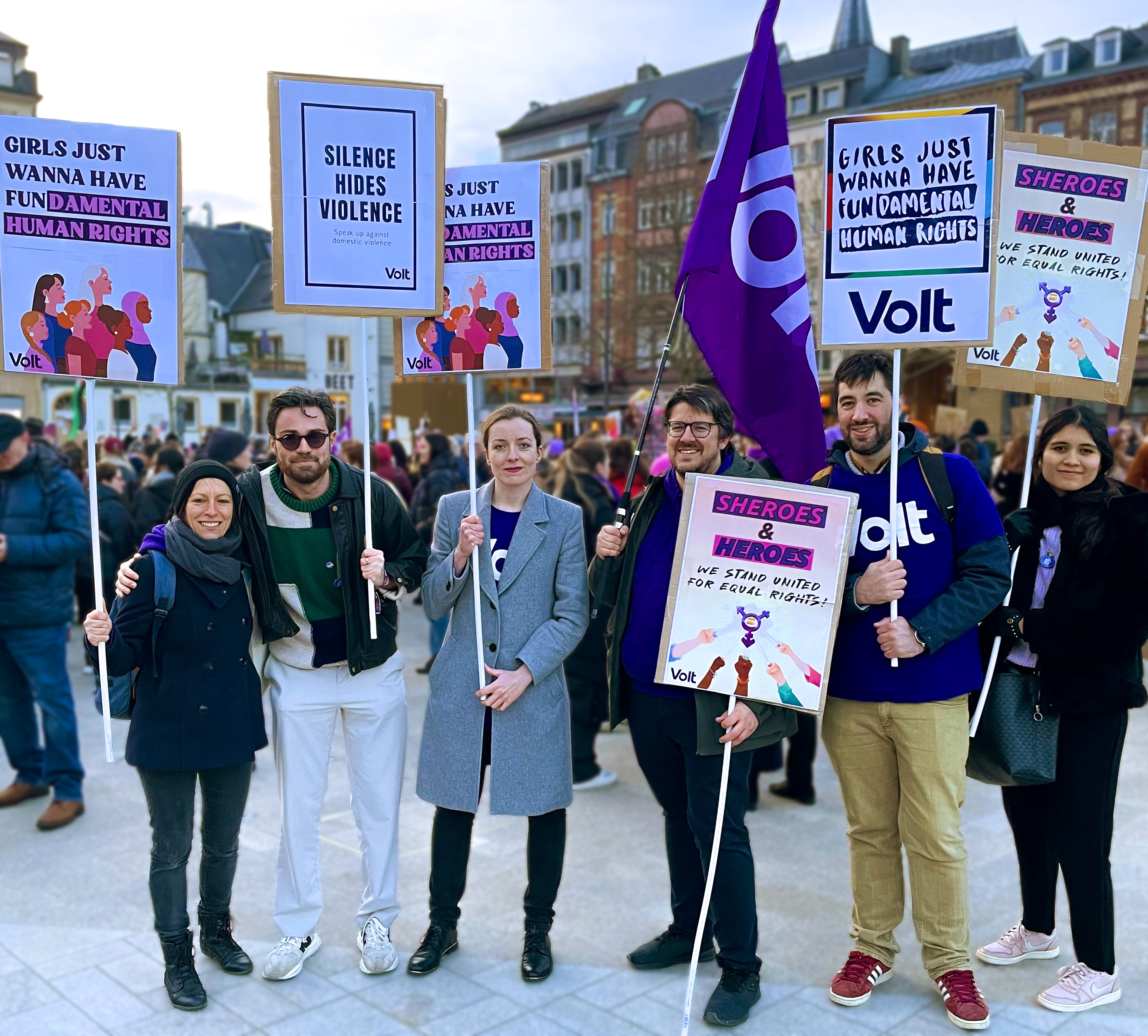♀️⚧️ On International Women's Day, we stand up for equal rights
We were there on International Women's Day and took part in the "Women's March" and the women's strike. The march through the capital of Luxembourg is an important statement to denounce the inequalities that still exist between the sexes.

2023 was the first year that the EU managed to score over 70 out of 100 on the European Institute for Gender Equality’s annual index. Although it represented the highest year-on-year rise in Europe’s journey towards gender equality, in the domains of work, time and money, there continues to be sluggish progress. This is a problem not only for women but for Europe as a whole.
To counter today’s challenges, from backsliding on reproductive rights to the perils of the gig economy, Volt has developed policies to build a Europe in which everyone can thrive regardless of their gender.

Fighting discrimination
Women and non-binary people experience discrimination in all domains of life, from the workplace to the domestic sphere. Recognising how gender norms, sexism and violence impact women’s lives informs policy that reduces discrimination on the basis of gender. To achieve this, Volt plans to:
Introduce an EU anti-discrimination law that extends existing protection in the area of employment to other areas such as social security, education and the supply of goods and services.
Push for the ratification of the Istanbul Convention on preventing violence against women, together with its full implementation by all Member States.
Strengthen sanctions against hate crimes, including against hate speech and digital violence, by expanding the definitions of such offences (e.g. misogyny).
Provide free access to menstrual hygiene products for all.
Press Member States to ban conversion therapy, enable trans people to have their gender legally recognised, and guarantee gender-affirming healthcare for LGBTQIA+ people.
Guaranteeing bodily autonomy
With the devastating rollback of reproductive rights in the United States and continued legislative and social regression in EU Member States such as Poland, safeguarding and codifying the rights of people to make decisions about their own bodies is as vital today as ever. To do this, Volt will be at the forefront of efforts to:
Make abortion on request accessible in law and practice by removing all undue burdens and barriers to accessing and providing abortion care.
Ensure that all forms of contraception are provided free of charge or reimbursed by insurance for all people regardless of age.
Press for the inclusion of Sexual and Reproductive Health and Rights in the EU Treaties and the right to abortion in the EU Charter of Fundamental Rights.
Criminalise forced sterilisation and forced contraception.
Decriminalise sex work and establish systems of regulation that reflect the needs of sex workers, including access to insurance, healthcare and other standard protections.
Supporting family life
It’s long been known that women perform considerably more unpaid labour than men, in terms of care work and household chores. The result is a gender pay gap that is, in considerable part, driven by a ‘motherhood penalty’. While 86% of working fathers in the EU are on full-time hours, just 48% of mothers are. To create an environment in which parents are supported in raising children, as well as to thrive in their careers, Volt aims to:
Ensure universal childcare and shared parental leave.
Promote access to free, high-quality daycare and preschool programmes for every child.
Align social systems across the EU by harmonising systems of pensions, sick leave, unemployment insurance and childcare benefits.
Support and fund innovative housing models, such as co-housing, rent-to-own and lifelong renting programmes to ease the financial barriers to home ownership.
Promoting meaningful, well-paid work
Reduced working hours are not the only component of the gender pay gap. Women also tend to be overrepresented in lower-wage sectors and more likely to be engaged in precarious employment, such as freelance work or on zero-hours contracts.
Work in the gig economy, although touted as giving greater freedom to workers, comes with next-to-no security and, for women, a greater than average pay gap and routine harassment and abuse. Women freelancers have been found to charge, on average, 20€ less per hour than their male counterparts.
To ensure that women not only have access to well-paid, meaningful work but to fair remuneration, Volt will:
Create a European Basic Income, requiring national governments to supplement the incomes of those earning under a particular threshold. To prevent exploitation, regionally-adjusted minimum wages will be defined and enforced.
Require countries to protect gig workers by granting them protections equivalent to full-time employment in terms of health, pensions and unemployment benefits.
Guarantee equal access to workplace opportunities without discrimination, and sanction enterprises that do not comply with inclusive employment.
Promote unionisation by protecting the right to collective bargaining.
Improving representation
Women remain underrepresented in politics and other leadership positions. Across the EU, just over 30% of MPs of national governments are women. Involving women in decision-making roles has been shown to improve policymaking as well as the way in which politics is done. To make sure women represent and are represented, Volt wants to:
Make gender-alternating party lists mandatory and establish representation goals for other minorities to ensure a plural and representative parliamentary composition.
Make reporting on gender representation mandatory at national, regional and local levels of government.
Integrate Feminist Foreign Policy into Member States’ Ministries of Foreign Affairs, requiring equal participation of women and other intersectionally disadvantaged groups within the EU’s diplomatic service.
(article by Kate Fistric for Volt Europa)